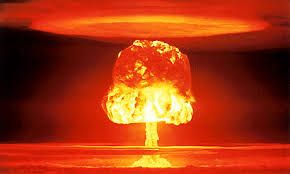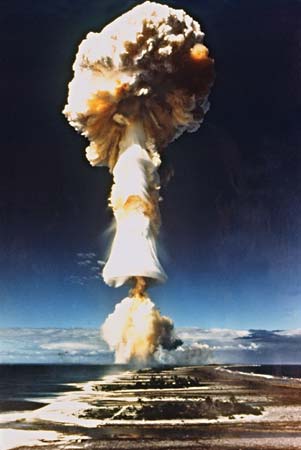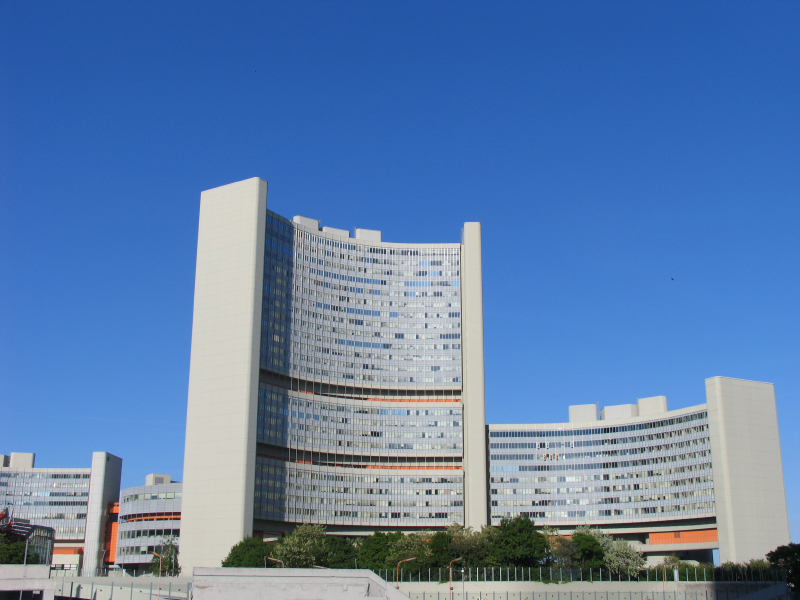On this page
These weapons cause large scale, indiscriminate death and devastation, and their existence is a constant threat to international security and our way of life.
New Zealand is party to a range of treaties and initiatives that work toward global disarmament and countering the spread of weapons of mass destruction. Many of the agreements we’re party to, deal with specific types of weapons of mass destruction – nuclear, chemical and biological.
PM video on Nuclear Disarmament
Watch Prime Minister Rt Hon Jacinda Ardern commemorating the 75th Anniversary of the atomic bombing of Hiroshima and Nagasaki.
75 years ago the world saw the catastrophic humanitarian consequences of nuclear weapons. It must not happen again. Only nuclear zero is worthy of the victims of Hiroshima & Nagasaki. PM Ardern urges all States to join the Treaty on the Prohibition of Nuc
Nuclear weapons

New Zealand has a long history of opposition to nuclear weapons dating back to when the UN was formed in 1945, the same year nuclear weapons were used in Hiroshima and Nagasaki. New Zealand joined the first Resolution of the first ever General Assembly, which voted for the elimination of nuclear weapons from national armaments.
Opposition to nuclear weapons and nuclear tests gained momentum in New Zealand throughout the 1960s and 1970s culminating in 1984 when the Government declared New Zealand ‘nuclear-free’. This was enshrined in legislation in the 1987 New Zealand Nuclear-Free Zone Disarmament and Arms Control Act.
Along with the other members of the Pacific Islands Forum, New Zealand is a member of the South Pacific Nuclear Free Zone, established by the Treaty of Rarotonga in 1985.
Nuclear states
Nine countries are known or believed to have nuclear weapons. China, France, Russia, the UK and the US are officially recognised under the Nuclear Non-Proliferation Treaty as 'nuclear weapon states'. Israel, India, Pakistan and North Korea are not party to the treaty and are usually referred to as the 'nuclear weapon possessor states'.
Nuclear treaties and agreements
New Zealand is a party to several international agreements and organisations that work toward disarmament and the non-proliferation of nuclear weapons. These include:
The Nuclear Non-Proliferation Treaty (NPT)
The 1970 NPT is the major global treaty that works towards a world free of nuclear weapons. Under its terms, the five nuclear weapons states agreed to pursue nuclear disarmament in exchange for non-nuclear weapons states' agreement not to develop or acquire them. However, all states have the right to use nuclear energy and technology for peaceful purposes.
Comprehensive Nuclear Test Ban Treaty (CTBT)

The CTBT has been signed by 183 countries and 163 of these have ratified it. However the treaty, drawn up in 1996, will only come into force when it is ratified by all of the 44 nuclear-capable countries - those that have nuclear weapons, power or research reactors. Only 36 of the 44 nuclear-capable countries have yet done so with China, Egypt, India, Iran, Israel, North Korea, Pakistan and the US still to ratify.
When it enters into force, the CTBT will ban all nuclear test detonations. To monitor this, it also establishes a comprehensive monitoring system to make sure no nuclear explosion goes undetected.
Most of the planned 337 nuclear explosion monitoring facilities are already operating. New Zealand runs seven of these facilities in different parts of New Zealand and the Pacific. These, and other stations, helped to confirm that North Korea had tested a nuclear weapon in 2013.
Read more about the Comprehensive Nuclear Test Ban Treaty(external link)

Reflecting its slogan “Atoms for Peace”, the International Atomic Energy Agency acts as the world’s nuclear inspectorate and supports the use of nuclear technology for peaceful purposes. Established by the UN in 1957, the IAEA makes sure countries comply with their commitments under the Nuclear Non-Proliferation Treaty.
The agency also develops nuclear safety standards and promotes the peaceful use of nuclear technology, e.g. for use in healthcare.
New Zealand actively participates in the work of the IAEA, particularly around the safety and security of nuclear material and ensuring that it’s only used for peaceful purposes. New Zealand took up a two-year seat on the IAEA Board of Governors in October 2014.
Read more about the International Atomic Energy Agency(external link)
Global Partnership Against Weapons of Mass Destruction
We also participate in the Global Partnership to fund the destruction of stockpiled weapons. It has funded the dismantling of weapons of mass destruction in Russia and other former Soviet states.
Read more about the Global Partnership Against Weapons of Mass Destruction(external link)
Proliferation Security Initiative
We participate in the 2003 Proliferation Security Initiative - an informal network of countries working together to prevent the trafficking of weapons of mass destruction and the materials used to make them. New Zealand will host an international exercise - Exercise Maru 2015 - to test responses to a proliferation incident.
Read more about the Proliferation Security Initiative(external link)
Global Initiative to Counter Nuclear Terrorism
This initiative was set up in 2006 to keep nuclear weapons out of the hands of terrorists. New Zealand is one of the 85 members of this voluntary group that works to strengthen the policies and procedures of each partner country so the world is well prepared to prevent, detect and respond to a nuclear terrorist threat.
Nuclear Security Summit (NSS)
New Zealand is one of 53 countries participating in the Nuclear Security Summit, a world leaders’ summit aimed at preventing nuclear terrorism.
Chemical weapons
Chemical weapons are toxic chemicals used to kill or injure. When released they may choke, poison or blister the victim, or disrupt their nervous system.
Chemical weapons have been used as a weapon of mass destruction since World War I, when chlorine gas and mustard gas were fired into trenches, killing around 100,000 soldiers. Although their use was banned under the Geneva Protocol in 1925, chemical weapons have been used in various conflicts since then, with the worst example being the 1988 chemical attack on a Kurdish town in Northern Iraq that killed up to 5,000 people in a single day.
Chemical weapons are of particular concern because they're considerably easier and cheaper to make than nuclear weapons, and easily within reach of most countries. The chemicals used to make these weapons have many commercial uses so they're often easy to obtain. That said, international treaties banning chemical weapons have been successful in significantly reducing the number of chemical weapons in the world.
Chemical Weapons Convention (CWC)
The Chemical Weapons Convention bans the production, stockpiling and use of chemical weapons and calls for the destruction of all existing chemical weapons. The treaty has had considerable success in that about 82% of the declared stockpile of chemical weapons has been destroyed. The convention, which entered into force in 1997, is managed and monitored by the Organisation for the Prohibition of Chemical Weapons (OPCW) based in the Hague.
Read more about the Chemical Weapons Convention and the OPCW
Biological weapons
Biological weapons contain disease-causing agents such as bacteria, viruses and fungi that harm or kill people, animals or plants. Weapons used in the past have spread diseases such as smallpox, pneumonic plague and anthrax among their targeted victims. Although biological weapons haven’t been used in warfare since World War II, the relative ease with which they can be made and delivered has raised fears they may become a weapon of choice for terrorists.
Biological Weapons Convention
New Zealand is a party to the 1972 Biological Weapons Convention (BWC) that bans the stockpiling, production and development of biological weapons. The convention extends to weapons directed against animals and plants as well as humans. New Zealand fully supports the convention but is concerned that, unlike the Chemical Weapons Convention, not all provisions are legally binding and there's no process to verify whether or not a laboratory is being used to create biological weapons.
Read more about the Biological Weapons Convention(external link)

